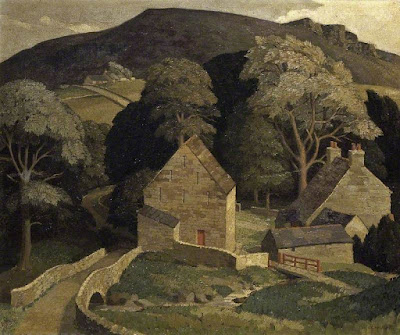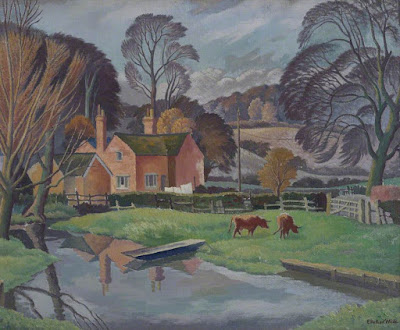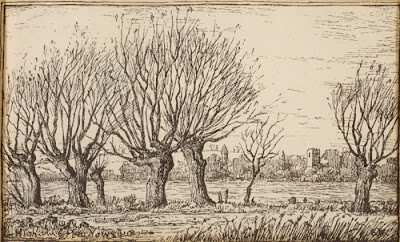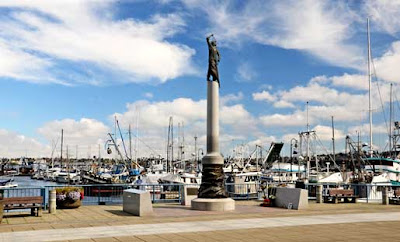I memorized "Adlestrop" on the day I first read it. Forty years ago? Or is it closer to fifty? Since that day it has always been with me. But now and then I still open Thomas' Collected Poems to read it, wanting to see it on the page. Nothing has changed.
Adlestrop
Yes. I remember Adlestrop --
The name, because one afternoon
Of heat the express-train drew up there
Unwontedly. It was late June.
The steam hissed. Someone cleared his throat.
No one left and no one came
On the bare platform. What I saw
Was Adlestrop -- only the name
And willows, willow-herb, and grass,
And meadowsweet, and haycocks dry,
No whit less still and lonely fair
Than the high cloudlets in the sky.
And for that minute a blackbird sang
Close by, and round him, mistier,
Farther and farther, all the birds
Of Oxfordshire and Gloucestershire.
Edward Thomas, The Annotated Collected Poems (edited by Edna Longley) (Bloodaxe Books 2008), page 51. The poem was written on January 8, 1915. Ibid, page 176. Thomas had written his first poem a month earlier, on December 3, 1914. Ibid, page 143.
We've had a surprising string of sunny and warm (even hot) days in this part of the world. No rain to speak of, and nary a cloud in sight. On a recent afternoon, as I walked beside a meadow that slopes down to the waters of Puget Sound, a ladybug landed on my right forearm. Landed "unwontedly," one might say. That wonderful way in which the World works.
I stopped walking, and watched as the visitor investigated my arm. After a few moments, it flew away on its own, its diaphanous wings glittering in the sunlight. Over a lifetime, it is these unwonted moments we remember, isn't it?
George Mackley (1900-1983), "Kentish Oast"
In one sense, Edward Thomas had found his home in the World from the day he was born.
"So on Tuesday, July 27th [1915] I lunched for the first time with Edward in uniform. It might have been next year when we were walking in the country that I asked him the question his friends had asked him when he joined up, but I put it differently. 'Do you know what you are fighting for?' He stopped, and picked up a pinch of earth. 'Literally, for this.' He crumbled it between finger and thumb, and let it fall."
Eleanor Farjeon, Edward Thomas: The Last Four Years (Oxford University Press 1958), page 154.
Hence, "Adlestrop." But there is a great deal more to "Adlestrop." And there is a great deal more to Edward Thomas. As I was thinking about him lately, this came to mind: "He was always a seeker after something in the world that is there in no satisfying measure, or not at all." More on this in a moment.
Home
Often I had gone this way before:
But now it seemed I never could be
And never had been anywhere else;
'Twas home; one nationality
We had, I and the birds that sang,
One memory.
They welcomed me. I had come back
That eve somehow from somewhere far:
The April mist, the chill, the calm,
Meant the same thing familiar
And pleasant to us, and strange too,
Yet with no bar.
The thrush on the oaktop in the lane
Sang his last song, or last but one;
And as he ended, on the elm
Another had but just begun
His last; they knew no more than I
The day was done.
Then past his dark white cottage front
A labourer went along, his tread
Slow, half with weariness, half with ease;
And, through the silence, from his shed
The sound of sawing rounded all
That silence said.
Edward Thomas, The Annotated Collected Poems, page 81. The poem was written on April 17, 1915, four months after "Adlestrop" was written. Ibid, page 226. Thomas wrote two other poems titled "Home." The first was written on February 23, 1915. Ibid, page 197. (It begins: "Not the end: but there's nothing more." Ibid, page 64.) The second was written on March 7 and 10, 1916. Ibid, page 282. (It begins: "Fair was the morning, fair our tempers, and/We had seen nothing fairer than that land." Ibid, page 113.)
"He was always a seeker after something in the world that is there in no satisfying measure, or not at all." An observation bound to catch the attention of melancholic romantics and romantic melancholics. (I'm afraid I shall have to plead guilty to that offense.) It is the final sentence in Walter Pater's "A Prince of Court Painters," a fictional "imaginary portrait" of the painter Jean-Antoine Watteau (1684-1721) which takes the form of journal entries written over a 20-year period by a woman who knew him. (Walter Pater, Imaginary Portraits (Macmillan 1887), pages 1-48.) Edward Thomas read Pater's works, and wrote a book about him: Walter Pater: A Critical Study (Martin Secker 1913). The book contains a short chapter on Imaginary Portraits, but the sentence I have quoted from "A Prince of Court Painters" is not mentioned.
Have no fear: it is not my intention to undertake literary detective work along the lines of, say, "Walter Pater's Influence on the Poetry of Edward Thomas." Rather, Pater's sentence simply returned to me on its own as I thought about Thomas, his life, the four poems that appear here, and his poetry as a whole. I would never wish to be reductive when it comes to Edward Thomas. More importantly, as I have often noted here in the past: the poems speak for themselves; no interpretation or explication is necessary.
John Aldridge (1905-1983), "Beslyn's Pond, Great Bardfield"
"It is enough, it would seem, to have been born into this world for a man to desire many things." (Kenkō (1283-1350), Tsurezuregusa, Chapter 1 (translated by Donald Keene), in Keene (editor), Essays in Idleness: The Tsurezuregusa of Kenkō (Columbia University Press 1967), page 3.) As a Buddhist monk, Kenkō would have been well-acquainted with the snares of desire in the lives of human beings, and of the need for us to avoid, or to extricate ourselves from, those snares. On the other hand, desires are innumerable, and come in various forms. For instance, what of a desire for home? Aren't most of us in search of home, whatever that may mean?
The Ash Grove
Half of the grove stood dead, and those that yet lived made
Little more than the dead ones made of shade.
If they led to a house, long before they had seen its fall:
But they welcomed me; I was glad without cause and delayed.
Scarce a hundred paces under the trees was the interval --
Paces each sweeter than sweetest miles -- but nothing at all,
Not even the spirits of memory and fear with restless wing,
Could climb down to molest me over the wall
That I passed through at either end without noticing.
And now an ash grove far from those hills can bring
The same tranquillity in which I wander a ghost
With a ghostly gladness, as if I heard a girl sing
The song of the Ash Grove soft as love uncrossed,
And then in a crowd or in distance it were lost,
But the moment unveiled something unwilling to die
And I had what most I desired, without search or desert or cost.
Edward Thomas, The Annotated Collected Poems, page 108. The poem was written from February 4 through February 9, 1916. Ibid, page 272.
"But the moment unveiled something unwilling to die/And I had what most I desired, without search or desert or cost." As in "Adlestrop" and "Home," a moment is sufficient to find oneself at home. And, although "desire" is involved, Thomas arrives at home "without search or desert or cost." As in "Adlestrop": ". . . the express-train drew up there/Unwontedly." And as in "Home": "I had come back/That eve somehow from somewhere far." How wonderful to know that one may arrive at home when one least expects it, if only for a moment. But perhaps this is a better way to put it: how wonderful to know that home may arrive when one least expects it, if only for a moment.
Bent over by the rain,
The ears of barley
Make it a narrow path.
Jōsō (1661-1704) (translated by R. H. Blyth), in Blyth, Haiku, Volume 3: Summer-Autumn (Hokuseido Press 1952), page 322. Blyth follows the haiku with this commentary:
"In old-fashioned novels, we often have the situation of a man or a woman who realizes only at the end of the book, and usually when it is too late, who it was he or she had loved for many years without knowing it. So a great many haiku tell us something that we have seen but not seen. They do not give us a satori, an enlightenment; they show us that we have had an enlightenment, had it often, -- and not recognized it."
Ibid, page 322 (italics in the original text).
Or, another way of looking at it:
"Attachment to the self renders life more opaque. One moment of complete forgetting and all the screens, one behind the other, become transparent so that you can perceive clarity to its very depths, as far as the eye can see; and at the same time everything becomes weightless. Thus does the soul truly become a bird."
Philippe Jaccottet (translated by Tess Lewis), notebook entry in May of 1954, in Philippe Jaccottet, Seedtime: Notebooks 1954-1979 (Seagull Books 2013), page 1.
George Mackley, "House by a Lane"
"And now an ash grove far from those hills can bring/The same tranquillity in which I wander a ghost/With a ghostly gladness." "Gladness." The word appears again in this poem, written by Thomas three months after he wrote "The Ash Grove":
I Never Saw That Land Before
I never saw that land before,
And now can never see it again;
Yet, as if by acquaintance hoar
Endeared, by gladness and by pain,
Great was the affection that I bore
To the valley and the river small,
The cattle, the grass, the bare ash trees,
The chickens from the farmsteads, all
Elm-hidden, and the tributaries
Descending at equal interval;
The blackthorns down along the brook
With wounds yellow as crocuses
Where yesterday the labourer's hook
Had sliced them cleanly; and the breeze
That hinted all and nothing spoke.
I neither expected anything
Nor yet remembered: but some goal
I touched then; and if I could sing
What would not even whisper my soul
As I went on my journeying,
I should use, as the trees and birds did,
A language not to be betrayed;
And what was hid should still be hid
Excepting from those like me made
Who answer when such whispers bid.
Edward Thomas, The Annotated Collected Poems, page 120. The poem was written on May 5, 1916. Ibid, page 292.
Having said earlier that I would never wish to be reductive when it comes to Edward Thomas, I'm afraid this thought comes to mind: where would his poems be without birds, without trees? Consider just the four poems appearing here. In "Adlestrop": a blackbird; "all the birds/Of Oxfordshire and Gloucestershire;" willows. In "Home": two thrushes; an oak; an elm. In "The Ash Grove": ash trees, of course. In "I Never Saw that Land Before": "the bare ash trees;" elms. All of them brought together beautifully in these lines: ". . . and if I could sing/What would not even whisper my soul/As I went on my journeying,//I should use, as the trees and birds did,/A language not to be betrayed." Try to imagine home without trees or birds.
This undated entry appears on one of the final pages of the diary kept by Thomas after he arrived in France in January of 1917: "And no more singing for the bird . . ." (R. George Thomas (editor), The Collected Poems of Edward Thomas (Oxford University Press 1981), page 194 (ellipses in the original text).)
On April 9, 1917, Edward Thomas died in France on the first day of the Battle of Arras.
James McIntosh Patrick (1907-1998)
"Stobo Kirk, Peeblessshire" (1936)
[A final note. Edward Thomas did not begin to write poetry until the last four years of his life. But I venture to say that no one in the United Kingdom during his lifetime had a greater knowledge of, and feeling for, first, what the essence of poetry consists of, and, second, what it means to be a poet. This is, of course, embodied in his own poetry. But his thoughts and feelings on the heart of poetry may also be found in his prose writings. I find this to be his finest articulation of what poetry is:
"What [poets] say is not chosen to represent what they feel or think, but is itself the very substance of what had before lain dark and unapparent, is itself all that survives of feeling and thought, and cannot be expanded or reduced without dulling or falsification. If this is not so, and if we do not believe it to be so, then poetry is of no greater importance than wallpaper, or a wayside drink to one who is not thirsty. But if it is so, then we are on the way to understand why poetry is mighty; for if what poets say is true and not feigning, then of how little account are our ordinary assumptions, our feigned interests, our playful and our serious pastimes spread out between birth and death. Poetry is and must always be apparently revolutionary if active, anarchic if passive. It is the utterance of the human spirit when it is in touch with a world to which the affairs of 'this world' are parochial. Hence the strangeness and thrill and painful delight of poetry at all times, and the deep response to it of youth and of love; and because love is wild, strange, and full of astonishment, is one reason why poetry deals so much in love, and why all poetry is in a sense love poetry."
Edward Thomas, Feminine Influence on the Poets (Martin Secker 1910), page 86-87.
We should remain mindful of a proviso included by Thomas in the passage above: "if what poets say is true and not feigning." Part of what this means is expressed wonderfully by Kingsley Amis, with Thomas in mind: "How a poet convinces you he will not tell you anything he does not think or feel, since you have only his word for it, is hard to discover, but Edward Thomas is one of those who do it."(Kingsley Amis, The Amis Anthology (Hutchinson 1988), page 339.)]
George Mackley, "Brackie's Burn, Northumberland"































